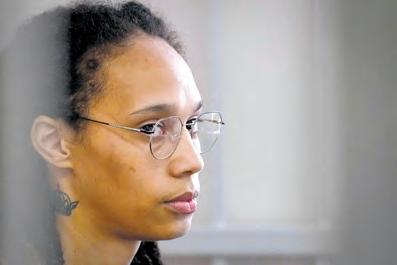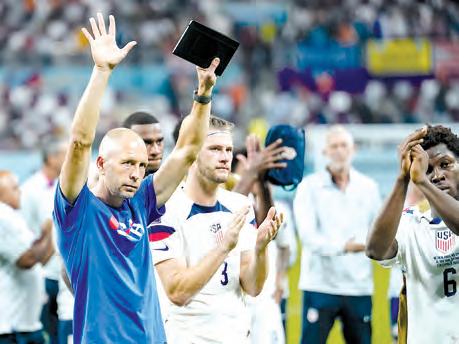
8 minute read
KRON 4 News at
Monday, December 5, 2022 SECTION B Matt Miller . Sports Editor . 707.427.6995
Griner facing ‘terrible’ life at remote penal colony in Russia
Tribune ConTenT agenCy
The inmates at IK-2 penal colony rise at 6 a.m. each day for a breakfast of milk porridge, bread and tea. Soon they leave their barracks at this aging facility about 300 miles southeast of Moscow, in the isolated republic of Mordovia.
Long days are spent in forced labor, working at sewing machines, with only a short break for lunch. By nightfall, prisoners are fed dinner and allowed an hour or less of free time before going to sleep in dormitories crowded with scores of bunk beds. The routine reportedly can stretch for weeks on end with no days off.
It is unclear if one of the newest arrivals – American basketball star Brittney Griner – will take part in this strict regimen or receive special treatment, but experts familiar with the criminal justice system in Russia paint a worrisome picture.
“Her life will be very difficult,” said Marina Alexandrova, a University of Texas associate professor who lectures on the history of Russian prisons. “It will be terrible.”
Among Russia’s hundreds of prisons, the 21 facilities clustered in Mordovia are especially notorious. Russia Behind Bars, a humanitarian group based in Moscow, alleges that labor conditions at the IK-2 violate national law, medical care is limited and substandard food provides little sustenance, especially during long, cold winters.
The world got its first look inside such colonies in 2013 when Nadezhda Tolokonnikova, of the punk band Pussy Riot, served time in another part of Mordovia for “hooliganism.”
Tolokonnikova went on a hunger strike and wrote an open letter that said sleep-deprived workers, pushed to their limits by unrealistic production quotas, endured intimidation and beatings. Toilets overflowed and inmates were left outside in the cold as punishment.
“As the prisoner saying goes,” Tolokonnikova stated, “’Those who never did time in Mordovia never did time at all.’”
The events that led Griner there began in mid-February when the 32-year-old Phoenix Mercury center arrived in Moscow to join UMMC Ekaterinburg, a club team that pays her a reported $1 million-plus to play during the WNBA offseason. Airport authorities searched her luggage and found two vaping cartridges with traces of cannabis oil.
Drug smuggling charges were soon overshadowed by world events as Russia invaded Ukraine, with Griner viewed as a political pawn. The U.S. State Department deemed her to be “wrongfully detained,” opening the way for the Biden administration to pursue a prisoner exchange. She was convicted in August, sentenced to nine years and eventually transported to IK-2, where her legal team recently visited.
“Brittney is doing as well as could be expected and trying to stay strong as she adapts to a new environment,” her lawyers said in a statement. “Considering that this is a very challenging period for her, there will be no further comments from us.”
Russian penal colonies are divided into four categories, ranging from lenient to strict. A 2017 Amnesty International report characterized most of these prisons as “among the worst in Europe.”
Griner is incarcerated at one of 35 mid-level or “general regime” facilities devoted to female inmates. IK-2 has a dozen or so nondescript structures, built long and narrow, surrounded by walls and barbed wire.
Like other colonies, IK-2 requires its population to dress in uniform. But unlike institutions for men, where inmate groups informally govern themselves, the women’s facility is run by administrators who can be brutally strict. Alexandrova said inmates “can be punished if their uniform is not buttoned
Alexander Zemlianichenko/Pool/AFP/ Getty Images/TNS file WNBA basketball superstar Brittney Griner sits inside a defendants’ cage before a hearing at the Khimki Court, outside Moscow, July 27.
See Griner, Page B8
San Francisco 49ers starting quarterback Jimmy Garoppolo (10) is helped up by 49ers’ Christian McCaffrey

Nhat V. Meyer/Bay Area News Group (23) after being injured during a sack against the Miami Dolphins, at Levi’s Stadium in Santa Clara, Sunday.
49ers beat Dolphins 33-17, Jimmy Garoppolo injured
Tribune ConTenT agenCy
SANTA CLARA — As unsightly as it was for the 49ers to have another injured quarterback carted off their home field, they won yet again.
Their fifth consecutive win came Sunday by outlasting the Miami Dolphins 33-17 and overcoming Jimmy Garoppolo’s foot injury on the 49ers’ opening possession.
Some 2 ½ months after the 49ers lost Trey Lance to a fractured ankle in the home opener, Garoppolo injured his left foot battling on a thirddown sack Sunday, all of which left Sunday’s game and perhaps many more in the hands of rookie quarterback Brock Purdy.
The 49ers (8-4) are not a quarterback-reliant team, even if their franchise lore says otherwise. Defense dictates the direction of this year’s team, with the help of offensive stars Deebo Samuel and Christian McCaffrey to come through in timely fashion.
The Dolphins (8-4) committed four turnovers, including a pair in the final minutes to seal their fate. Nick Bosa’s third sack of the game – he took the NFL lead with 14 1/2 this season – forced a Tua Tagovailoa fumble that Dre Greenlaw recovered and returned 23 yards for the game’s final score. Fred Warner intercepted Miami backup Skylar Thompson to open the Dolphins’ final possession, with 1:42 to go.
Next up, the 49ers complete their three-game homestand next Sunday against Tom Brady and the Tampa Bay Buccaneers, who take a 5-6 record into Monday night’s home game against New Orleans.
All due respect to Purdy’s relief performance (25-of37, 210 yards, two touchdowns, one interception), but the 49ers’ most crucial throw came with six minutes left. That’s when coach Kyle Shanahan chucked his challenge flag over 20 yards onto the field to rightfully contest a fourth-down conversion catch by the Dolphins’ Mike Gesicki at the 49ers’ 33-yard line. Greenlaw was there to help defend the pass to Gesicki near the Dolphins’ sideline.
Just like last Sunday’s 13-0 shutout win over the Saints, the 49ers tried salting away the final minutes of victory with running plays, including a 30-yard cutback effort by McCaffrey to the 11-yard line. The Dolphins’ third sack of Purdy and a George Kittle holding penalty backed things up for Robbie Gould, but he banged in his fourth field goal in four attempts Sunday, this final one from 48 yards with 2:03 to go.
McCaffrey had 146 yards from scrimmage (80 receiving, 66 rushing) and Samuel had 58 yards on six receptions to key the 49ers’ offense.
Tagovailoa finished 18-of-33 for 295 yards, two touchdowns and two interceptions, with Tyreek Hill catching nine balls for 146 yards and one touchdown.
In his most meaningful action as a pro, Purdy sometimes threw into tight windows with success, and sometimes he got wild, especially on third down. All in all, it was an acceptable effort from this past draft’s “Mr. Irrelevant” as the 262nd and final player selected (out of Iowa State).
The 49ers’ bid for a fifth straight game with a second-half shutout came to an end early in the fourth quarter, which opened with a 19-yard catch by Hill and then a 45-yard touchdown grab by Hill, who raced past Charvarius Ward’s oneon-one coverage.
That cut the 49ers’ lead to 23-17 with 14:28 to go, and it gave Miami the momentum it couldn’t get in the third quarter.
Tua Tagovailoa had not thrown an interception in 193 passes before Jimmie Ward and Deommodore Lenoir snagged consecutive throws in the third quarter. The interceptions led to two Gould field goals, from 43 and 36 yards, to stake the 49ers to a 23-10 lead entering the fourth quarter.
Ten seconds into the game, the 49ers were down 7-0, having allowed former 49er Trent Sherfield to zip through their defense for a 75-yard catch-and-run touchdown on Tua Tagovailoa’s quick strike. Safety Tashaun Gipson Sr. was one of several defenders caught out of place, as Sherfield sped past linebackers Fred Warner and Azeez Al-Shaair, and safety Talanoa Hufanga.
As the ambitious USMNT exits the World Cup, the focus shifts to what’s possible
The WashingTon PosT
RAYYAN, Qatar — To a man, the U.S. men’s national soccer team coaches and players spoke of a bright future, of renewed interest in the program and regained respect globally. Their World Cup ended Saturday with a 3-1 round-of-16 defeat to the Netherlands in a match against a practiced opponent that exposed shortcomings and innocence.
Within the ambitious group, though, there was a feeling they had only scratched the surface.
Thirteen players who helped form the nucleus are 25 or younger and most are employed by clubs in major European leagues. Others in that age range, from this roster and the wider player pool, were waiting in the wings.
It’s not just a promising group but a tight group, one that parlayed chemistry into cohesive performances for much of their stay. Even after the disappointment of being eliminated, the players remained together late into the night talking about what’s possible in 2026, when the World Cup is staged in the United States, Mexico and Canada.
“Can we win against top teams? Can we perform well against top teams well enough to win? I think this group is close,” Coach Gregg Berhalter said. “The American public should be optimistic.”
The U.S. team showed it belonged here, going toe to toe with England, pushing the Netherlands and being among five of the 32 countries to go unbeaten in the group stage. The breakthrough moment against the titans of the game, though, remains elusive.
Over 32 years and eight appearances, the U.S. record is 2-13-7 against teams from Europe and South America, soccer’s dominant continents. In Qatar, the Americans gained draws against Wales and England and fell to the Netherlands.
Baby steps for an adolescent team.
“They can look forward to a great future,” said Dutchman Denzel Dumfries, who dominated the right flank and posted a goal and two assists. “They can certainly grow into an elite team.”
The first order of business is who will lead the way. Berhalter’s contract expires soon and the U.S. Soccer Federation must decide whether he is the man to take the program to the next level.
That’s assuming Berhalter wants to stay on the job; he could decide to return to the day-to-day demands of coaching a club.
“For the last month, month and a half, I
See Cup, Page B8



